
Dark Victory is a 1934 Broadway play written by George Brewer Jr. and Bertram Bloch starring Tallulah Bankhead. It premiered on November 9 at the Plymouth Theatre and ran until December 19.

Dark Victory is a 1934 Broadway play written by George Brewer Jr. and Bertram Bloch starring Tallulah Bankhead. It premiered on November 9 at the Plymouth Theatre and ran until December 19.
Judith Traherne is a Long Island socialite whose life is spent in frivolous, hedonistic pastimes. She indulges in alcohol and cigarettes, and enjoys horse riding. She experiences dizziness and headaches, and after an uncharacteristic riding accident, she is referred to a specialist, Dr. Frederick Steele. Steele is in the midst of closing his New York City office in preparation of a move to Brattleboro, Vermont, where he plans to devote his time to brain cell research. He reluctantly agrees to see Judith, who is initially antagonistic towards him. She shows signs of short-term memory loss, but dismisses these and other symptoms. Steele convinces her the ailments she is experiencing are serious and potentially life-threatening, and puts his career plans on hold to tend to her. Steele finds that she has an inoperable brain tumor, and predicts she has only a year to live. Shortly after becoming blind, she will die. Judith falls in love with the idealistic doctor, and they enjoy a brief respite in the Vermont countryside before she faces imminent death. She comes to the realization that their relationship has brought meaning to the life she had been leading.
Source: [1]
The property, described by Robert Benchley as " Camille without all the coughing" (the Lady of the Camellias has a long and agonizing death scene which was made famous by Sarah Bernhardt famously pathos-inspiring rendition of it, complete with coughing), had been floating around the entertainment capitals of both American coasts, and deficiencies in the script were acknowledged. Bankhead had read it and rejected it while she was still in Hollywood on her contract with Paramount Pictures. Katharine Hepburn had agreed to try it out in summer stock before changing her mind. When the script reached Bankhead again, Jock Whitney, wealthy industrialist and her sometimes-lover, assured her that the play's deficiencies were corrected as Maxwell Anderson had revised it. Tallulah was adept at glossing over the holes in a script and was determined to make a success of it for Whitney.
Robert Edmond Jones, who had designed the settings for John Barrymore's Richard III and Hamlet a decade earlier, did the set craft, and Bankhead's costumes were by Elsa Schiaparelli. Robert Milton directed the production. David O. Selznick was considering filming Dark Victory with Greta Garbo, but Bankhead was uninterested in serving as a dry run for another actress. She got a contract stipulation that if she did not play Judith Traherne on screen she would receive a percentage of the film sale.
After 51 performances, on December 20, 1934, it was the first sold-out performance since the opening night. But Bankhead awoke to find that she had lost her voice. Estelle Winwood, who'd spent the night at Bankhead's, called for a doctor. He instructed Bankhead to proceed to the theater and that he would meet her there, but by the time Bankhead reached the theater, her face was swelling rapidly. She was sent home and the matinee was canceled. Bankhead had contracted an infection that was then (before the advent of antibiotics) potentially deadly. Without Bankhead, Whitney was not interested in prolonging the run of Dark Victory, and it closed immediately.
The play was generally received well critically, and Bankhead's acting was praised. However, the play was commercially unsuccessful.
Robert Garland in the Telegram, reviewing the play, wrote that Bankhead had acted with "unflagging skill". In the Sun, Richard Lockridge wrote: "Miss Bankhead gives an altogether admirable performance for the first sane act and a half. At odd moments even in the later difficult moments she brings into her playing a note of tense feeling which cuts through the theatricalism." [2]
Percy Hammond of the Herald Tribune wrote of the scene where Judith, at her nadir, considers giving herself to the groom at her estate stables. "Miss Bankhead was gorgeously tempting and tempted, and for a moment or two many of us feared that she would request him to visit her in the middle of the night."
Regarding the lukewarm commercial reception, Variety speculated that Dark Victory was the right play at the wrong time (i.e., the Great Depression. Public audiences greatly preferred comedy, fantasy, and other escapist or light-hearted productions, over tragedies). "Tragedy has a place in the theatre, but it seems so much vexation has plagued the people that they prefer to be amused instead of going through an ordeal." The paper's "Ibee." reported that several spectators in the first-night audience had passed out in response to the intensely realistic medical examination Tallulah received in the opening scene. [3]
Bette Davis starred in a 1939 film version with a vastly improved script, for which she received an Academy Award nomination. She had seen a performance of the play, and later admitted to emulating Bankhead in the role. In 1963, the film was remade as Stolen Hours with Susan Hayward and Michael Craig, directed by Daniel Petrie. The time frame was updated and the locale changed to England. [4]
On April 4, 1938, Barbara Stanwyck and Melvyn Douglas starred in a 60-minute adaptation of the stage play on Lux Radio Theatre . [5] Then, on January 8, 1940, Davis and Spencer Tracy performed a second adaptation on Lux Radio Theatre, this one based on the subsequent 1939 film. [6] On March 6, 1952, CBS Radio's Hollywood Sound Stage aired a condensed 30-minute version starring Stanwyck and David Brian. [7] [8]
In 1953, the film was remade under its original title for a TV adaptation for the Broadway Television Theatre, starring Sylvia Sidney, Christopher Plummer, and Ian Keith. In 1976, it was remade under its original title as an NBC television movie starring Elizabeth Montgomery as television producer Katherine Merrill under the care of Dr. Michael Grant, portrayed by Anthony Hopkins; this version was directed by Robert Butler.
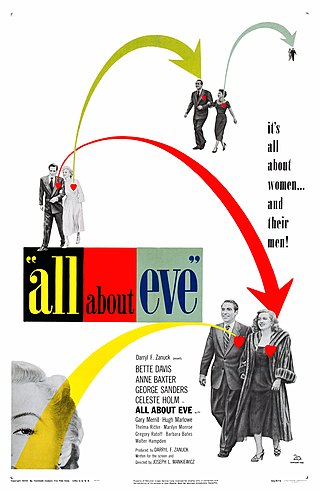
All About Eve is a 1950 American drama film written and directed by Joseph L. Mankiewicz, and produced by Darryl F. Zanuck. It is based on the 1946 short story "The Wisdom of Eve" by Mary Orr, although Orr does not receive a screen credit.

Dark Victory is a 1939 American melodrama film directed by Edmund Goulding, starring Bette Davis, and featuring George Brent, Humphrey Bogart, Geraldine Fitzgerald, Ronald Reagan, Henry Travers, and Cora Witherspoon. The screenplay by Casey Robinson was based on the 1934 play of the same title by George Brewer and Bertram Bloch, starring Tallulah Bankhead.
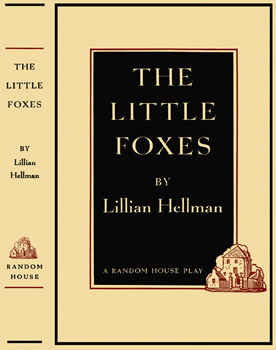
The Little Foxes is a 1939 play by Lillian Hellman, considered a classic of 20th century drama. Its title comes from Chapter 2, Verse 15, of the Song of Solomon in the King James version of the Bible, which reads, "Take us the foxes, the little foxes, that spoil the vines: for our vines have tender grapes." Set in a small town in Alabama in 1900, it focuses on the struggle for control of a family business. Tallulah Bankhead starred in the original production as Regina Hubbard Giddens.

Morning Glory is a 1933 American Pre-Code drama film which tells the story of an eager would-be actress and her journey to stardom, and her gains and losses. The picture stars Katharine Hepburn, Douglas Fairbanks Jr., and Adolphe Menjou, was adapted by Howard J. Green from a then-unproduced stage play of the same name by Zoë Akins, and was directed by Lowell Sherman. Hepburn won her first Academy Award for Best Actress. Morning Glory was remade in 1958 under the title Stage Struck.
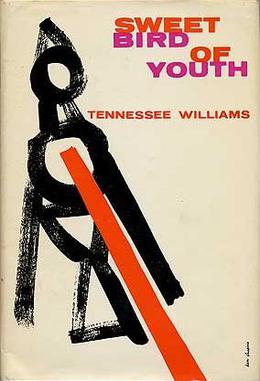
Sweet Bird of Youth is a 1959 play by Tennessee Williams that tells the story of a gigolo and drifter, Chance Wayne, who returns to his hometown as the companion of a faded movie star, Alexandra del Lago, whom he hopes to use to help him break into the movies. The main reason for his homecoming is to get back what he had in his youth, primarily, his old girlfriend, whose father had run him out of town years before. The play was written for Tallulah Bankhead, a good friend of Williams.
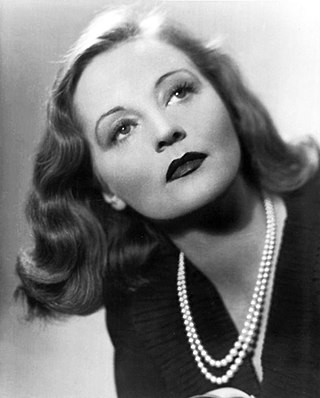
Tallulah Brockman Bankhead was an American actress. Primarily an actress of the stage, Bankhead also appeared in several films including an award-winning performance in Alfred Hitchcock's Lifeboat (1944). She also had a brief but successful career on radio and made appearances on television. In all, Bankhead amassed nearly 300 film, stage, television and radio roles during her career. She was inducted into the American Theater Hall of Fame in 1972 and the Alabama Women's Hall of Fame in 1981.
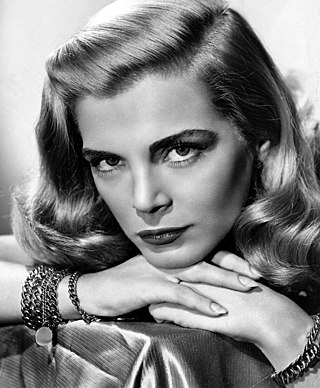
Lizabeth Virginia Scott was an American actress, singer and model for the Walter Thornton Model Agency, known for her "smoky voice" and being "the most beautiful face of film noir during the 1940s and 1950s". After understudying the role of Sabina in the original Broadway and Boston stage productions of The Skin of Our Teeth, she emerged in such films as The Strange Love of Martha Ivers (1946), Dead Reckoning (1947), Desert Fury (1947), and Too Late for Tears (1949). Of her 22 films, she was the leading lady in all but three. In addition to stage and radio, she appeared on television from the late 1940s to early 1970s.
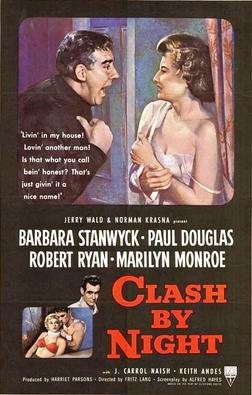
Clash by Night is a 1952 American film noir drama directed by Fritz Lang and starring Barbara Stanwyck, Paul Douglas, Robert Ryan, Marilyn Monroe and Keith Andes. The film is based on the 1941 play by Clifford Odets, adapted for the screen by writer Alfred Hayes. It is the first major film to credit Monroe before the title, albeit with fourth billing.

Katherine Locke was a Broadway actress in the late 1930s.

Blanche DuBois is a fictional character in Tennessee Williams' 1947 Pulitzer Prize-winning play A Streetcar Named Desire. The character was written for Tallulah Bankhead and made popular to later audiences with Elia Kazan's 1951 film adaptation of Williams' play; A Streetcar Named Desire, starring Vivien Leigh and Marlon Brando.
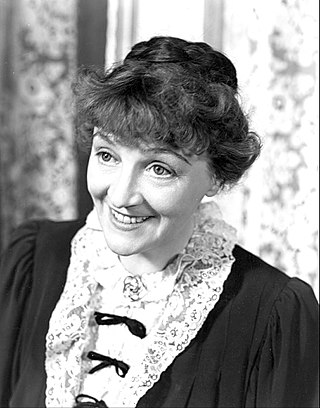
Eileen Cecilia "Patricia" Collinge was an Irish-American actress and writer. She was best known for her stage appearances, as well as her roles in the films The Little Foxes (1941) and Shadow of a Doubt (1943). She was nominated for an Academy Award and won a NBR Award for The Little Foxes.

Terri Sue "Tovah" Feldshuh is an American actress, singer, and playwright. She has been a Broadway star for fifty years, earning four Tony Award nominations. She has also received two Emmy Award nominations for Holocaust and Law & Order, and appeared in such films as A Walk on the Moon, She's Funny That Way, and Kissing Jessica Stein. In 2015–2016, she played the role of Deanna Monroe on AMC's television adaptation of The Walking Dead.
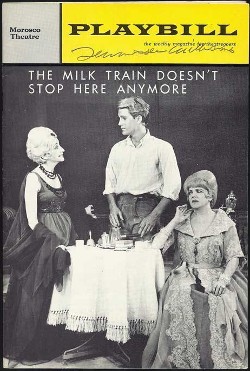
The Milk Train Doesn't Stop Here Anymore (1963) is a play in a prologue and six scenes, written by Tennessee Williams. He told John Gruen in 1965 that it was "the play that I worked on longest," and he premiered a version of it at the Festival dei Due Mondi in Spoleto, Italy, in July 1962.

Fanatic is a 1965 British horror thriller film directed by Silvio Narizzano, and starring Tallulah Bankhead, Stefanie Powers, Peter Vaughan, Yootha Joyce, Maurice Kaufmann and Donald Sutherland. It was written by Richard Matheson based on the 1961 novel Nightmare by Anne Blaisdell.

Forsaking All Others is a 1934 American romantic comedy-drama film directed by W.S. Van Dyke, and starring Robert Montgomery, Joan Crawford and Clark Gable. The screenplay was written by Joseph L. Mankiewicz, which was based upon a 1933 play by Edward Barry Roberts and Frank Morgan Cavett starring Tallulah Bankhead.

Clash by Night is a romantic triangle drama by Clifford Odets which premiered on Broadway in 1941 and was later adapted to film and television. The title derives from Matthew Arnold's poem "Dover Beach" (1867):

The Little Foxes is a 1941 American drama film directed by William Wyler. The screenplay by Lillian Hellman is based on her 1939 play The Little Foxes. Hellman's ex-husband Arthur Kober, Dorothy Parker and her husband Alan Campbell contributed additional scenes and dialogue.
Mary Caswell Orr was an American actress and author whose short story "The Wisdom of Eve", published in the May 1946 issue of Cosmopolitan, was the basis of the Academy Award-winning film All About Eve (1950). In private life, Orr used her married name, Mary Orr Denham.
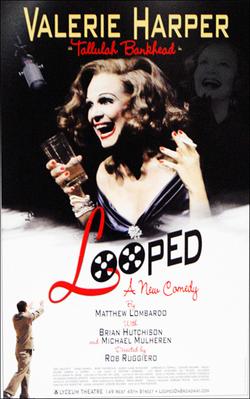
Looped is a play by Matthew Lombardo about an event surrounding actress Tallulah Bankhead. It had a Broadway run in 2010, after two previous productions in 2008 and 2009, all three of them featuring Valerie Harper.
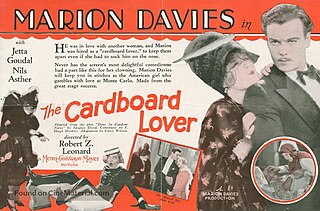
The Cardboard Lover is a 1928 American silent romantic comedy film directed by Robert Z. Leonard and starring Marion Davies, Nils Asther and Jetta Goudal. It was produced by Cosmopolitan Productions and distributed by Metro Goldwyn Mayer.